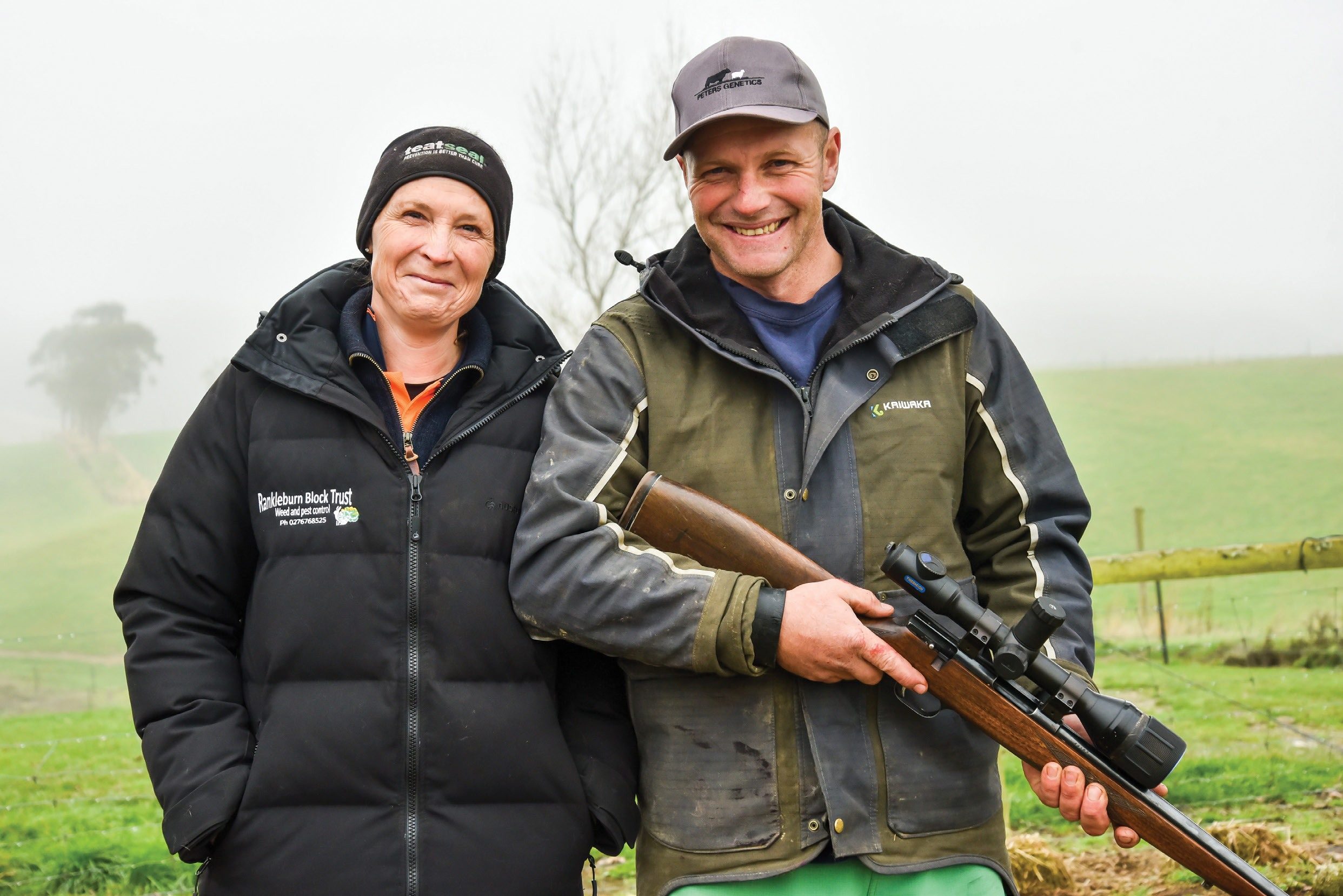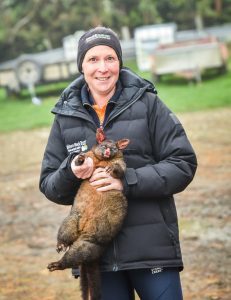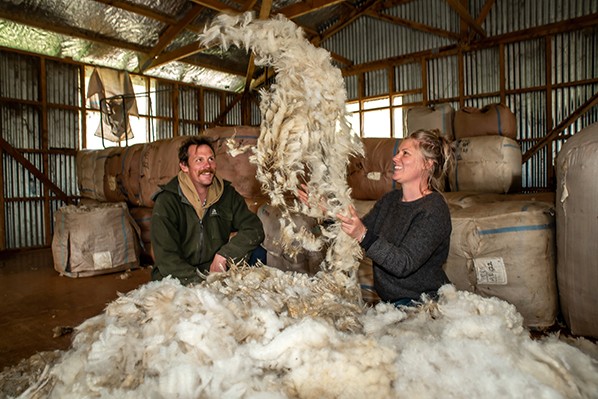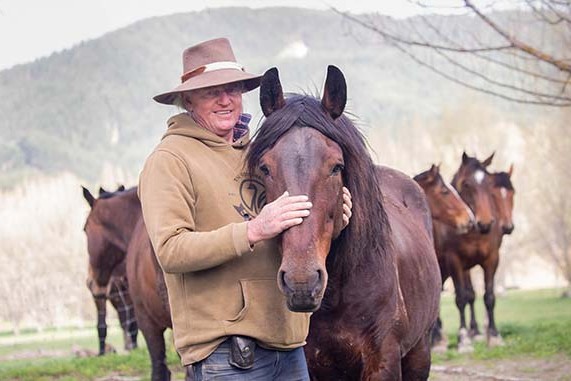Who ya gonna call?
Wild deer, hares, pigs, and even possums are attacking the fodder crop. Valuable winter feed is being lost along with wrecked electric fences. TB is being spread. So who are you going to call? Pest busters. By Terry Brosnahan.

In West Otago, Clint Robinson (37) is a pest buster with a difference. He not only shoots pests, he takes them away. He and his partner Audrey McBeth, also 37, operate a pest destruction company that supplies dead hares, rabbits, possums and deer to pet food companies.
An unusual customer is Canterbury Meats which supplies Orana Park in Christchurch. The lions like hares, unskinned and just the green gut removed. The hares are packed into banana boxes, frozen in the walk-in freezer and sent north.
The pet food companies are more fussy. For possums they want the carcase 99% clean, head and claws cut off, green gut removed but the internal organs left in.
“So they can test them for any diseases,” Audrey says. A heavy possum is worth about $14. Hares are worth $10.
They take a horse float to supermarkets and pick up the banana boxes they need for shipping, but they’re not always easy to get hold of.
Clint has worked on farms and managed them, but he’s always wanted to own a farm himself. That’s a work in progress.

In 2019 Clint was managing a south Otago farm and Audrey was a vet nurse. To create capital, they set up gorse spraying and pest control businesses. Clint was a rodeo rider and sold two of his horses to help finance the gorse-sprayer truck unit.
He was on his own driving the gorse sprayer but needed something else to give all year round cashflow.
So, while managing a farm, he started to shoot pests in his spare time and supply carcases to a pet food factory, Otago Pet Foods. It was good money and the pest supply business didn’t need a lot to set up.
Audrey also drives the gorse-sprayer truck, spraying with a handgun on steep farms.
“I’m Safety Sally. I would rather crawl further and be safe.” She says generally it’s only another 10–15 metres.
They work on Otago and Southland farms for 8–10 months of the year, spraying gorse and boom spraying.
Audrey also helps with the handling of dead pests, including possum plucking. One possum was 9kg liveweight after gorging on fodder beet on a south Otago farm and her arms were sore from holding it up to the plucker.
Puddley, their Jack Russell finds wounded deer and catches possums though he came off second best trying to hold a pig.
Clint says they are honest with farmers because he has a farming background, wants to be a farmer and wants repeat customers. If the gorse is too thick and handgun spraying is uneconomic they will tell the owner. The edges will be sprayed to make it easy for the helicopter.
The couple has two children, Audrey’s daughter Elaina,12, and Clint’s son Cody, five.
The business is called the Rankleburn Block Trust, set up when Clint bought 16ha from his parents 15 years ago. Their farm is on the border with Southland and the postal address says Gore, but Clint is adamant it’s in Otago. His father Mark refuses to use Gore and puts Tapanui.
“That’s why he never gets many letters.”
Hares and possums popular
Clint didn’t have annual tonnage figures available, but says it is usually 1.5–2t/month of hares and possums.
The day before we arrived, a one tonne consignment of possum and hares went to the North Island. About 300 hares weighed a tonne.
Hares and possums are the main pests harvested because they cover a small area and there’s no shortage of the pests.
“We can get rid of those easily to the North Island.”
They found just supplying Otago Pet Foods didn’t work because there was a limit to the amount they could take every month and that made the cost of having two shooters and two trappers uneconomic, so they now also supply Out of the Wild, a pet food company in Tauranga. Clint says between 1.5 and 2 tonnes of possums and hares are sent up a month.
“We try to do a tonne of possums a month.”
He says possum fur was about $140/kg before Covid, then fell to $80/kg. It came back to $90 and then no one was buying it from overseas.
Luckily Clint and Audrey had a deal with a local buyer who wanted no more than 30kg/month. That makes a possum’s fur worth about $8 in the winter months when the fur is heavier.
Goats and deer are supplied when wanted. They leave the head and skin on, removing the green guts.
They shoot pigs on contract but the pet food companies don’t want them because they are too lean.
They avoid shooting hares for three days either side of a full moon.
“They just go all loopy,” Clint says.
They avoid areas where 1080 and other poisons have been dropped and to that end, he says local knowledge and honesty from the landowners is important.
Clint employs a full-time shooter Ben Spence (20) who uses a bolt action rather than an automatic rifle. It makes him concentrate and he can’t just keep shooting. Young shooters tended to work only 2–3 months then find the cold, late nights and having to fill a quota too hard.
“You can’t be paid $300/night and expect to come back with four rabbits.”
He employs a possum trapper, David Scott. In summer, David (in his 70s), will get up and leave home to be on a farm before 7am. For five or six hours he will drive around checking the leg-hold traps. Around sheds and houses he uses cages.
“Just in case we catch the kids’ cats,” Clint says.
Strict regulations
When Clint started shooting it was low key stuff with a spotlight on a helmet. Now it’s thermal imaging. He still wears the spotlight for safety.
He says one thing about working in winter in Otago is that thermal imaging works during the day.
No one wants lead in their dinner and about 95% of the pests are shot in the side of the head. With high meat prices, more pet food is being consumed by humans.
MPI’s pet food regulations are strict. All animals have to be processed within six hours of being killed and chilled or frozen in eight hours.
For safety, night shooters arrive early and talk to the farmer.
A shooter will scout the area for hazards while there’s still daylight. If they are not trapping at least 20 possums a day, it isn’t worth it and Clint will pull out. The same with rabbit shooting.
“If there’s fewer than 60 for the night, we won’t come back for 12 months.”
Clint does contract shooting, where a farmer or forest owner has asked to clear an area. One farmer lost 6ha of crop to deer in eastern Southland over a two-week period.
The deer also get caught in electric fences and drag hundreds of metres of wire. It’s usually so twisted it has to be cut.
Clint feels he is filling a gap that the Government used to – and should still be – filling.
“They should be helping out because they want no TB.”
He says they should be putting a bounty on ‘per tail’ because they want a pest-free country. They’ve got rid of the rabbit boards and expect farmers to do their own shooting.
“…this is a bit tough when they can’t even find staff to help them on the farm for a start.”
He says then they expect farmers to go out and shoot rabbits or they threaten to fine them.
The shooters will only pick up pests if they are handy and quick to retrieve.
Clint knows the good farms to go to for supply and hopes to be able to continue trapping possums as a free service. Six months ago they thought of charging. They use .22 magnum rifles and the ammunition price has gone from 32c to 72c/bullet in 12
months, along with other costs.
He says it can cost $3.50 for an animal that’s worth $5.
They charge forestry because the grass is so long the shooters can’t find the hares.
On one farm in Middlemarch they shot 12,000 rabbits and 300 cats during two-and-a-half years. The farmer had a scare with TB and wanted to get rid of cats and possums.
“We haven’t shot one possum on that farm.”
When a pet food company wants 300–400 rabbits which will last a month, Wanaka and other Central Otago are the places to shoot.
The 10-year plan is going well but Clint would still rather be farming.
Earlier this year the pair put in a good offer for a farm. They were unsuccessful, but undeterred.
A major competitor for land is forestry. Ironic, given that Clint shoots the hares to stop them nipping the tops off pine trees.




